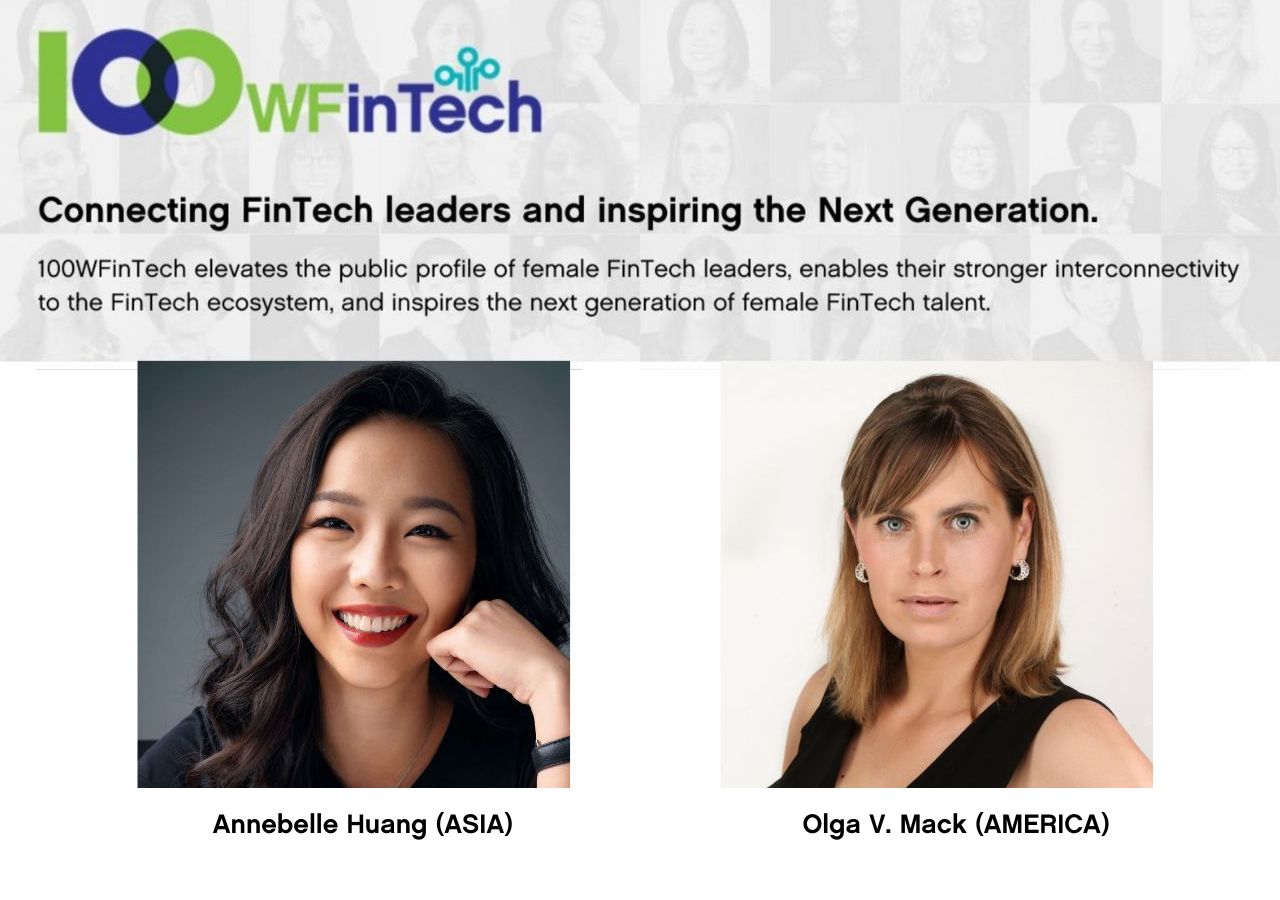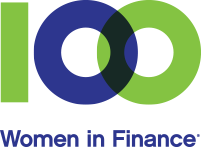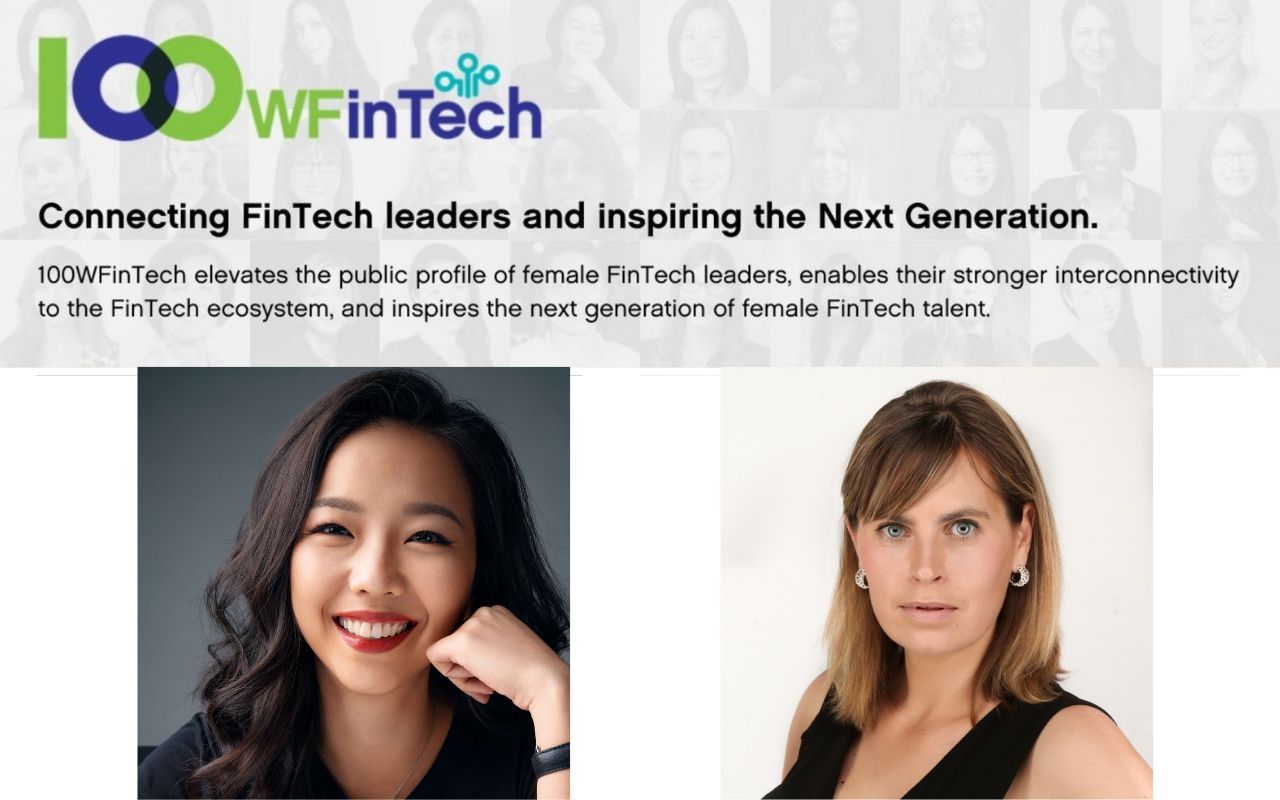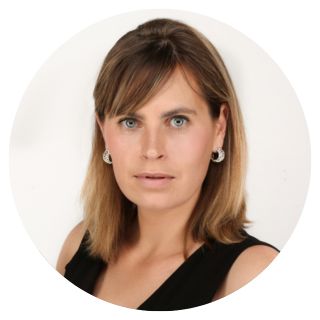 In the special month of International Women Day in March, we will share in our ‘100WFinTech Changemakers’ series about the journey, mission, and learnings of 2 senior FinTech women in the Public Directory from around the world, Annebelle Huang, Managing Partner of Amber Group in digital asset space, and Olga V. Mack, Fellow at CodeX, The Stanford Center for Legal Informatics, and a Generative AI Editor at law.MIT Computational Law Report.
In the special month of International Women Day in March, we will share in our ‘100WFinTech Changemakers’ series about the journey, mission, and learnings of 2 senior FinTech women in the Public Directory from around the world, Annebelle Huang, Managing Partner of Amber Group in digital asset space, and Olga V. Mack, Fellow at CodeX, The Stanford Center for Legal Informatics, and a Generative AI Editor at law.MIT Computational Law Report.
We tell stories of how the 100WFinTech Changemakers have created and leveraged opportunities that were open to them via their writing, entrepreneurship, investing, and community building. In the process, they open doors for women investors and diverse founders and broaden financial access for many. We hope the stories of these female fintech leaders can inspire the next generation of finance professionals to build a better and more inclusive world by leveraging technology.
If these stories and missions resonate with you, please share them with your network, get in touch with us, or join the Public Directory.
We are always looking for Changemakers to profile, please contact us if you know someone we should feature.
Annabelle Huang, Managing Partner of Amber Group
McKinsey’s Top Women Innovators 2022 Award
Location: Singapore, Asia Pacific
LinkedIn: https://www.linkedin.com/in/annabelle-huang/
First, we chat with Annabelle Huang, Managing Partner at Amber Group, a global leading digital asset company. Annabelle transitioned to crypto in 2018 after time at Deutsche Bank and Nomura advising funds on structured FX solutions and risk management. Prior to Amber Group, she led Asia for decentralized trading platform AirSwap. Now at Amber Group, Annabelle spearheads its crypto liquidity offerings, venture investment and marketing strategies.
Beyond her role, Annabelle is a vocal advocate for blockchain adoption. She regularly speaks at major FinTech events worldwide, such as Singapore FinTech Festival, Hong Kong FinTech Week, and Token2049, educating audiences at the intersection of traditional finance and cryptocurrency. She is also frequently quoted in publications like Bloomberg, Business Insider and CoinDesk.
Committed to diversity, Annabelle works to support and encourage more newcomers and women through mentorship. She is a mentor of the Female Entrepreneurs Worldwide Incubator, Asia DeFi Network, Brinc Accelerator, TZ APAC Tezos Incubator, and a founding member of Web 3 Women, and an honoree of McKinsey’s Top Women Innovators 2022 award. She holds a BS in Math and Finance from Carnegie Mellon University.
▪ ▪ ▪
Annabelle shares her journey co-building Amber Group, the leading digital asset company in Asia, emphasizing the importance of vision and empowering other builders. Her goal is to empower innovators and drive crypto adoption.
▪ ▪ ▪
Why did you co-build Amber Group as digital asset platform in Asia and how has it been involved in changing the digital asset community?
“When I first got into the cryptocurrency space back in 2018 in New York, I was immediately fascinated by the potential of blockchain technology to transform how we think about money, finance and the internet itself. Coming from a traditional finance background, it really opened my eyes to new possibilities.
I loved meeting the innovators who were daring to build on this innovative new infrastructure and I wanted to be a part of this community. I decided to head back to Asia, where I’m from originally, since that was where liquidity aggregated and where things moved fast.
That’s why I joined the co-founders of Amber Group, with whom I shared a very similar background and vision, to embark on a mission to cultivate our influence and build our presence in Hong Kong and Singapore and across Asia as a whole. We saw this as a huge opportunity to make decentralized technologies and finance more accessible in our own backyard and empower a new generation of entrepreneurs.
In the early days, it was an adventure figuring everything out as we went. But talking to all the founders and developers really solidified my belief that decentralized networks could help create a more fair and global financial system. We wanted Amber Group to play a role in that.
Now, a few years in, I’m really proud of the impact we’ve had by supporting innovative projects through investments, partnerships and the platforms we’ve built. It’s been amazing to see the community grow from a handful of pioneers to thousands strong.
My hope is that Amber Group can continue enabling builders to turn their visions into reality, while also driving mainstream adoption of this technology. There’s still so much left to do, but I feel optimistic that together we can realize the promise of blockchain.”
What have you learned in the process? If you could redo the process, is there anything you would change?
“Through my experience in this industry, the most important lesson I’ve learned is to stay true to your vision and values, no matter the external pressures or successes of others. There is so much change and unknown in this space, it’s easy to get distracted from your original goals.
If we had to do it over again, I think we would have maintained a laser focus on what problem we identified and wanted to solve authentically, rather than get pulled into every hot new opportunity. We also would have been more judicious about scaling our team size, mindful of how disruptive rapid growth can be.
Going forward, it’s about tuning out the noise, really understanding your core strengths, and pace yourself for sustainable success rather than reactionary decisions.”
Were any elements excluded when building the Amber Group as a digital asset platform in Asia / Digital Asset community in Singapore and HK?
“Looking back, one area we did not fully realize was to build beyond our core products and core markets. We decided to launch a consumer platform in addition to our institutional offerings and expanded quickly from Asia to every active region globally. Navigating regulations and different consumer culture and behaviors proved more difficult than anticipated. Rather than forcing growth in a distracting sector, we made the painful decision to refocus on our core competencies of institutional services, liquidity provisioning and infrastructure. With hindsight, expanding our consumer division might have been premature given the challenges – safety and sustainable models are priorities as adoption grows over the long term.”
What would you do if you were not doing what you are doing?
“I’ve always enjoyed problem solving which is well suited in a startup environment. So I’d like to think if I didn’t get involved with crypto I would still be building products in some other fields.”
What advice would you give to someone wanting to follow a similar path, i.e., building a digital asset platform / Digital asset community builder?
“For anyone aspiring to build in the digital asset space, my top piece of advice would be to stay true to your vision and values. This industry evolves incredibly quickly, and it can be easy to get distracted by new opportunities or pressures to chase short-term gains at the expense of your long-term strategic plans.
Focus on developing solutions that you’re genuinely passionate about and believe will create real value for users. Surround yourself with a strong team who share your core values. And tune out as much of the external noise as possible – hype cycles and bear markets will come and go, but building a sustainable business requires patience and perseverance.
While expanding strategically is important for growth, don’t feel pressured to branch into every hot new area or take on too much too fast. Scale deliberately according to your strengths. Partnerships can help accelerate your vision in a safer way than trying to do everything in-house.
Finally, maintain a flexible, adaptable mindset. This industry moves at lightning speed, so be prepared to learn, iterate and adjust your strategy based on real-world feedback. But don’t lose sight of your original goals in the process.
If you lead with vision, values and a long-term perspective, you’ll be well positioned to weather volatility and capitalize on new opportunities as the digital assets space continues to evolve in exciting ways. Staying true to your north star is the best way to build a sustainable business with impact.”
What is the biggest takeaway you want to leave with the reader at 100 Women in Finance/100WFinTech?
“People always ask what it’s like being a woman in crypto – and while we are still in the minority, I am heartened to see more and more women coming onboard the industry. I have been very encouraged by the women I have met in my line of work. There is also a lot more awareness of crypto and blockchain these days, with people reacting to blockchain with more curiosity than judgment. This is a positive sign for what lies ahead for the industry and the adoption of the technology in the years to come.
This industry moves rapidly, with endless opportunities emerging. As leaders, how else can we leverage these innovations to empower women financially? What more can we do to smash barriers for those building careers at the nexus of finance and tech?
I’m honored to help build awareness of crypto’s utility among women and minorities for their journeys. Blockchain technology can unlock investment opportunities while addressing key social challenges. These are questions our industry must tackle as we shape crypto’s future.
My message is – get involved. Apply your expertise to accelerating women’s participation through education, networks and inclusive product design. Together, by guiding crypto’s ongoing growth, we can fulfill its promise of empowerment and equality for all. Our leadership plays a crucial role in realizing that vision.”
Olga V. Mack,
Fellow at CodeX, The Stanford Center for Legal Informatics, and a Generative AI Editor at law.MIT Computational Law Report
Location: San Francisco Bay Area/Silicon Valley, USA
Website: https://www.linkedin.com/in/olgamack
LinkedIn: https://www.linkedin.com/in/olgamack/
Then, we chat with Olga V. Mack. Olga is an accomplished entrepreneur, executive, and attorney dedicated to harnessing transformative technologies for positive change. Serving as a Lecturer at Berkeley Law, Fellow at CodeX, The Stanford Center for Legal Informatics, and a Generative AI Editor at law.MIT Computational Law Report, Olga strongly advocates for integrating innovative technologies that enhance functionality and accessibility across various domains. With a proven track record as an award-winning general counsel, operations specialist, and tech startup advisor, Olga encourages the adoption of cutting-edge technologies to drive progress and efficiency.
As a seasoned TEDx presenter, Olga leverages her unique blend of expertise in technology and business to inspire and educate audiences. Recognized as a top speaker and thought leader, she shares her insights through various platforms, including Forbes, Bloomberg Law, law.MIT Computational Law Report, Newsweek, Venture Beat, Above the Law, ACC Docket, and many other popular and industry publications.
Olga’s work revolves around exploring the transformative potential of emerging technologies across industries. Her accomplishments include being honored with prestigious awards such as Silicon Valley Women of Influence, ABA Women in Legal Tech, Make Your Mark, Corporate Counsel of the Year, and Women Leaders in Technology Law.
▪ ▪ ▪
Olga shared her entrepreneurial journey building her contract management company and her lessons learned from having run several companies and divisions. Olga also discussed her books at the forefront of technology and business and her excitement about AI’s evolving role in governance and ethics.
▪ ▪ ▪
What has led you to build Parley Pro? What is the problem you are solving and your vision behind your work?
“At the heart of Parley Pro’s inception was the recognition of a critical gap in how businesses manage and extract value from contracts. We identified that key data, crucial for driving revenue and mitigating risks, was often buried in contracts, untapped due to outdated management processes. Parley Pro addresses this by harnessing the power of automation and advanced technology to transform contract management. Our platform not only automates routine tasks, thereby increasing efficiency, but also employs advanced technology such as AI to analyze contract data. This analysis provides actionable insights, helping businesses to make informed decisions and strategically manage risks. Our vision is to redefine contract management as a data-driven, intelligent process, turning contracts into valuable assets for business intelligence and strategic planning.”
As Parley Pro has been acquired by LexisNexis, what have you learned in the process? If you could redo the process, is there anything you would change?
“After Parley Pro’s acquisition by LexisNexis, the experience has been immensely educational and insightful. One key learning is the importance of aligning vision and culture between the acquiring and acquired companies. This alignment is crucial for a smooth transition and realizing the acquisition’s full potential. Another significant lesson is the value of clear and consistent communication throughout the process, both within our team and with our stakeholders, to manage expectations and maintain trust.
Reflecting on my broader experience with mergers and acquisitions throughout my career, I would place an even stronger focus on comprehensive due diligence if I were to revisit any of these processes. This involves a deeper exploration of the entities’ operational, cultural, and strategic aspects. Furthermore, I would enhance the emphasis on strategic planning post-acquisition. It’s crucial to not only consider the immediate impacts of a merger or acquisition but also to strategize for long-term growth and innovation, ensuring that each transaction is a stepping stone towards continued success and development in the industry.”
What are your biggest learnings having run several companies and divisions? Where do you seek inspiration and support?
“Having had the privilege of running several companies and divisions, my biggest learnings center around the importance of adaptability, the value of a strong team, and the necessity of customer-centric thinking. Adaptability has been key; the business landscape is constantly evolving, and the ability to pivot and embrace change is crucial for survival and growth. Building and nurturing a strong team is another critical factor. Success is rarely a solo endeavor – it’s the result of the collaborative efforts of individuals who bring diverse skills and perspectives. Fostering a culture of open communication, mutual respect, and continuous learning within the team has been vital. Additionally, maintaining a customer-centric approach has always guided my decisions. Understanding and anticipating customer needs, and consistently delivering value, is fundamental to any business’s success.
In terms of seeking inspiration and support, I turn to a variety of sources. Networking with peers in the industry provides valuable insights and fresh perspectives. I also stay abreast of the latest trends and innovations in my field through continuous learning – be it through reading, attending conferences, or engaging in professional development programs. Moreover, mentorship, both in being a mentor and having mentors, has been a significant source of guidance and inspiration. It’s a two-way street that offers fresh perspectives and wisdom gleaned from diverse experiences. Lastly, I find that stepping back from the work environment to engage in different activities or hobbies can provide unexpected inspiration and a renewed sense of creativity.”
What would you do if you were not doing what you are doing?
“If I were not engaged in my current profession, I would likely pursue a path where I could blend my passion for innovation with a desire to make a tangible impact on society. One area that deeply interests me is education technology. The potential to revolutionize how we learn and teach, especially in underserved communities, is immense and largely untapped. I would focus on developing or contributing to platforms that make quality education more accessible and engaging, leveraging technology to tailor learning experiences to individual needs and preferences.
Additionally, I have always been fascinated by the intersection of technology and sustainability. Working on projects or initiatives that harness advanced technologies to address environmental challenges would be another avenue I’d be eager to explore. This could involve developing sustainable energy solutions, promoting eco-friendly urban planning, or contributing to conservation efforts through tech-driven strategies.
In both scenarios, the common thread would be using technology as a force for good, driving innovation in ways that not only advance our capabilities but also improve lives and protect our planet. This alignment of technological advancement with social and environmental responsibility reflects my belief in the power of technology to be a catalyst for positive change.”
Tell us about the books you have written covering corporate governance, smart contracts, blockchain, and startups. What have you learned after the launches you can share with 100WF members?
“In my journey as an author, I’ve had the opportunity explore several key areas at the forefront of modern business and technology: corporate governance, smart contracts, blockchain, and the startup ecosystem. My book “Blockchain Value: Transforming Business Models, Society, and Communities” explores the profound impact of blockchain technology beyond just cryptocurrencies. It explores how blockchain can revolutionize various sectors by enabling transparency, efficiency, and trust. In “Fundamentals of Smart Contract Security,” co-authored by me, we tackle the critical aspects of securing smart contracts, an essential component in the blockchain ecosystem, emphasizing the need for robust security measures in this rapidly evolving space.
Currently, I am working on three books set to be published this year. “Visual IQ for Lawyers” (ABA 2024) is designed to enhance the visual communication skills of legal professionals, a crucial aspect in today’s increasingly visual-centric world. “The Rise of Product Lawyers: An Analytical Framework to Systematically Advise Your Clients Throughout the Product Lifecycle” (Globe Law and Business 2024) focuses on the evolving role of lawyers in the product development process, highlighting the need for legal expertise throughout the product lifecycle. Lastly, “Legal Operations in the Age of AI and Data” (Globe Law and Business 2024) examines the intersection of legal operations with artificial intelligence and data analytics, underscoring the transformative impact of these technologies in the legal field.
From these writing and publishing experiences, a key learning I can share with 100 Women in Finance (100WF) members is the importance of continuous learning and adaptability in our rapidly changing world. Each book required extensive research and a deep understanding of emerging trends, reinforcing the need to stay ahead of the curve in our respective fields. Additionally, the process highlighted the power of interdisciplinary knowledge – how insights from technology, law, and business can synergistically create more robust and innovative solutions. These experiences have also underscored the value of clear communication and the ability to distill complex concepts into accessible, actionable insights, an invaluable skill in any professional setting.”
What are you most excited about in the future? Share an amazing fact people don’t know.
“In the future of law and finance, I am most excited about the evolving role of Artificial Intelligence (AI), particularly in the context of governance and ethics. The integration of AI in these sectors is not just a technological advancement; it’s a paradigm shift that necessitates robust governance frameworks and a strong emphasis on ethics. AI has the potential to enhance decision-making processes, optimize financial services, and revolutionize legal research and analysis. However, this comes with the responsibility to ensure that these technologies are governed by ethical principles and regulations that protect privacy, ensure fairness, and prevent biases.
An intriguing and lesser-known aspect in this domain is the development of AI systems capable of understanding and interpreting complex legal and financial regulations. These systems are not only automating routine tasks but are also providing insights and analyses that were previously unattainable due to the sheer volume and complexity of the data involved. This advancement is leading to a more proactive approach to compliance and risk management, transforming how institutions approach regulatory challenges. The future holds a promise of AI systems that not only comply with existing laws and ethical standards but also help in shaping new governance frameworks suited for the digital age.”
What advice would you give to someone wanting to follow a similar path, i.e., found a company/write a book?
“For someone aspiring to follow a similar path of founding a company and writing a book, my advice would be to embrace the art of storytelling. Whether you’re building a business or penning a book, the power of a compelling narrative cannot be overstated. In business, your story is not just what you tell people; it’s also what they believe about you based on the signals your actions and brand send. The story of your company should be authentic and engaging. It should resonate with your audience, just as a captivating book.
Moreover, I’d encourage you to cultivate a ‘Renaissance mindset.’ Often, we’re told to specialize, but in the journey of entrepreneurship and authorship, being a polymath can be incredibly beneficial. Dive into diverse subjects, be curious about everything, and don’t be afraid to blend seemingly unrelated fields. The most innovative ideas often come from the intersection of different disciplines.
Lastly, prepare to be a lifelong learner. The path of creating a business and writing a book is as much about personal growth as it is about professional achievement. Embrace every challenge as a learning opportunity and every setback as a story for your next chapter. Remember, your unique journey with its ups and downs is what will make your book and business genuinely one of a kind.”
Upcoming events organized or co-hosted by 100WFinTech are as follows:
March 5, 2024, in-person event, Hong Kong, “Wealth HER Way: Empowering FInancial Independence”, sponsored by Endowus
March 14, 2024, virtual three-part series, Part 2, “Tell Your Story,” co-sponsored by 100WFinTech and NY Mid-Career Committees, hosted by Kadima Careers
April 1, 2024, virtual three-part series, Part 3, “Pivoting Mid Career,” co-sponsored by 100WFinTech and NY Mid-Career Committees, hosted by Kadima Careers
April 8, 2024, in-person event as part of Femme Leadership Summit during New York Fintech Week, New York (USA), ‘Transitioning Careers – Innovating Your Career Plan into Fintech’ Panel produced by 100WFinTech and co-sponsored by Nasdaq, Carta, Ramp and Grasshopper Bank
April 10, 2024, in-person event, Munich (Germany), “Investing in the future: unveiling digital tools and AI Opportunities” Panel and Networking, co-sponsored by Scalable Capital and BlackRock
Q2 2024, in-person event, New York (USA), “FedNow and Payment Rails”, sponsored by Fingercheck
▪ ▪ ▪
This is the sixth article of our Changemakers in fintech series. In the future, we will continue to feature fintech book authors, TED Talks speakers, lecturers, and influencers from around the world.
If you are interested in partnering with us at 100 Women in FinTech, please visit our website and contact us here.



